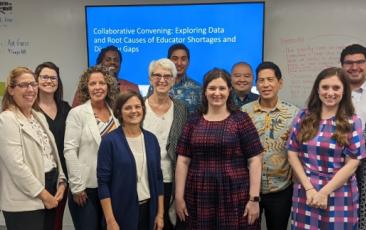Center on Great Teachers and Leaders
Building bridges from today's educator workforce challenges to a future where every student can thrive while learning from a talented and diverse educator workforce.

Projects
Under our federal grant that began in 2012 and concluded in September 2019, we provided support to all 15 regional comprehensive centers, all 50 states, and multiple districts.
Under AIR's leadership, the GTL Center team continues to support state and district efforts to address educator workforce challenges to ensure every student can thrive while learning from a talented and diverse educator workforce.
- State Projects: we work directly with state education agencies on a wide range of educator talent management strategies.
- Multi-State Collaborations: we work with state education agencies, federal and regional service providers, and districts to build a partnership around a common effort.
- District Projects: we work directly with district leaders and teams, often in collaboration with a state education agency to design, pilot, and scale-up sustainable educator talent management strategies.
- Research Projects: we work with clients to conduct a range of research studies that support evidence-based decision-making, including meta-analysis, evidence synthesis, and program evaluation.
Explore our projects highlights below to learn more about how we support states and districts across the country.
State Projects

GIS Mapping to Strengthen the Educator Workforce in Colorado
In collaboration with the Region 12 Comprehensive Center and the Regional Education Laboratory Central (REL Central), AIR's GTL Center staff supported the Colorado Department of Education in developing GIS maps to better understand and address educator shortages in the state.

Coaching and Training to Strengthen Retention of Special Education Teachers in Georgia
We supported the Georgia Department of Education in their efforts to improve the retention of new special education teachers by developing and implementing high-quality mentoring and induction programs.
Multi-State Collaborations

The National Collaborative on Educator Workforce Shortages and Diversity
Three state teams from Hawai'i, Ohio, and Louisiana participated in a two-year, data-driven facilitated coaching process. State teams worked with GTL Center coaches to find solutions that were equity-focused and built for sustainability, while also engaging the community in understanding the root causes of shortages and gaps in educator workforce diversity.

Comprehensive Center Network: Cross-State Collaborative on Educator Shortages and COVID-19
In collaboration with Region 1 and 9 Comprehensive Centers, we facilitated five peer-to-peer engagements with state teams to identify local challenges related to educator shortages exacerbated by COVID-19 and share strategies and opportunities to strengthen the educator workforce.
Additional Projects
Back to top
District Projects

Addressing the Root Causes of Teacher Shortages in Lansing Public Schools
We supported the Regional Education Laboratory (REL) Midwest and Lansing Public Schools in developing an action plan for reducing teacher shortages within the district.

Improving Teacher Retention in Chicago Public Schools
We collaborated with the Midwest Comprehensive Center to help Chicago Public Schools support educators and students in Chicago to use data-informed decision-making leading to positive changes.
Back to top
Research Projects

How Learning Forward’s Professional Learning Standards Are Associated with Teacher Instruction and Student Achievement: A Meta-Analysis
We conducted a systematic review and meta-analysis to examine the effects of professional development programs on teacher instruction and student outcomes. Our study helped contextualize these standards within randomized field studies of professional learning published between 2010 and 2020. The study also contributed to the understanding of how changes in teacher instruction are associated with changes in student achievement (i.e., the mediating effect of teacher instruction on student outcomes).

The Impact of a $10,000 Bonus on Special Education Teacher Shortages in Hawai‘i
Co-authored with Center for Analysis of Longitudinal Data in Education Research (CALDER Center) at AIR and Boston University, this project examined the impact of a bonus policy implemented in 2020 by Hawai‘i Public Schools. Experts analyze how Hawai'i represents a unique but instructive case of how strategic financial incentives can help address special education teacher shortages.
Back to top

